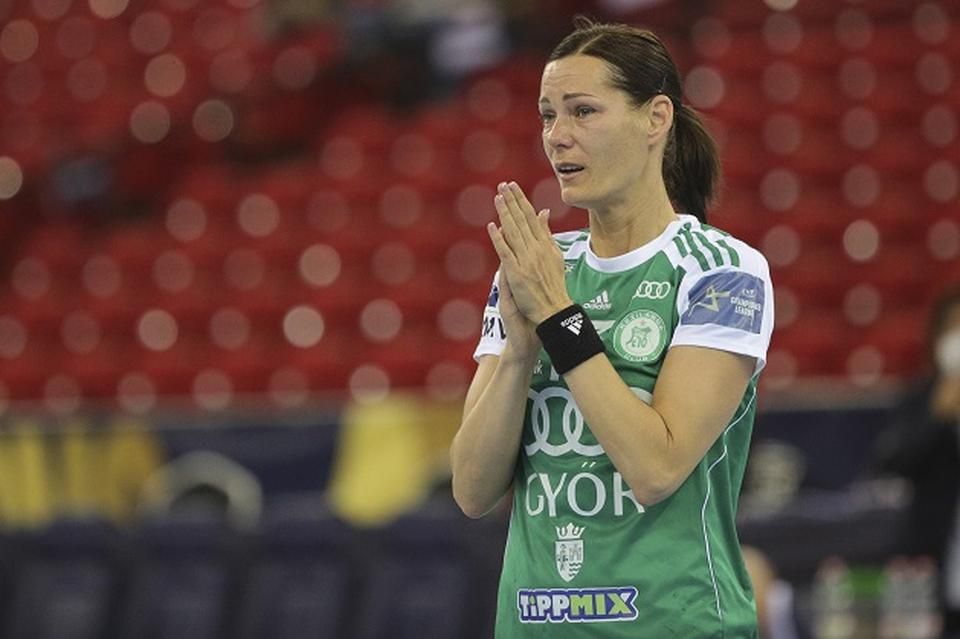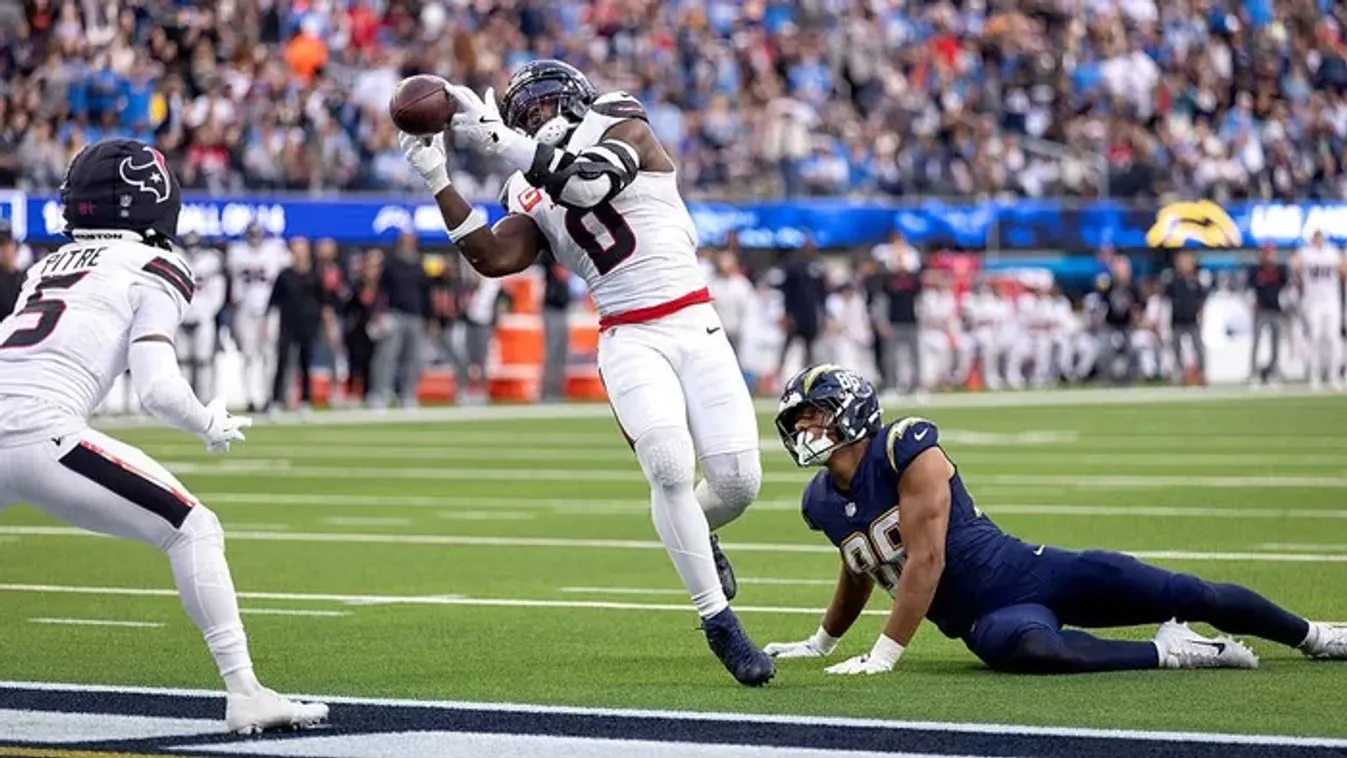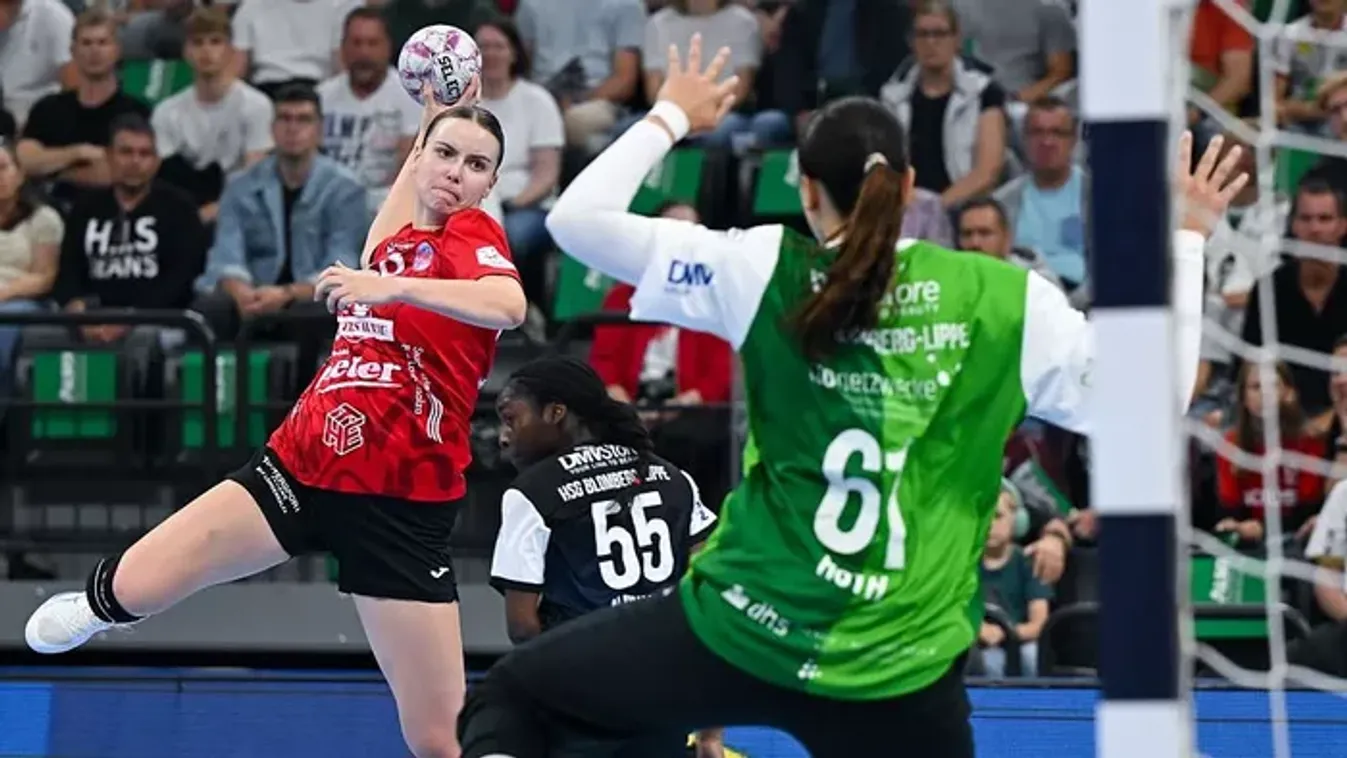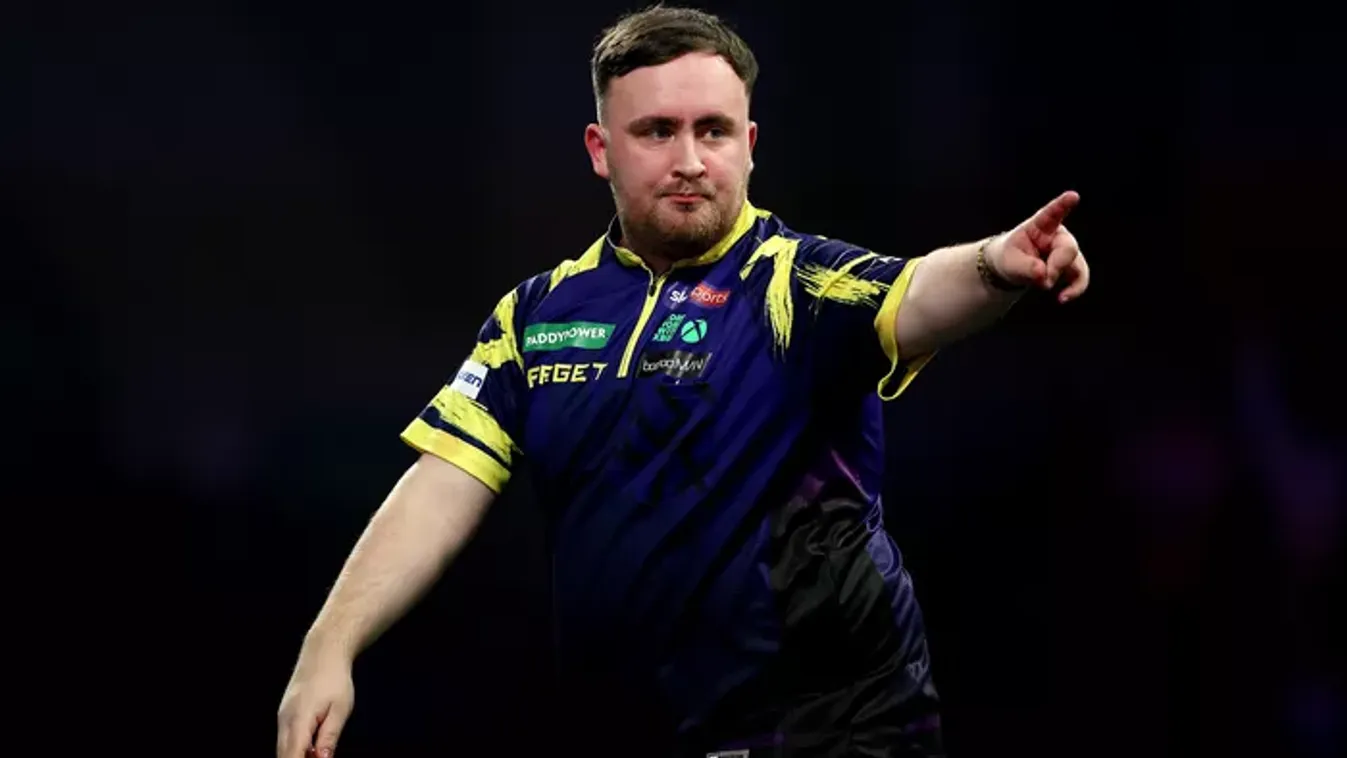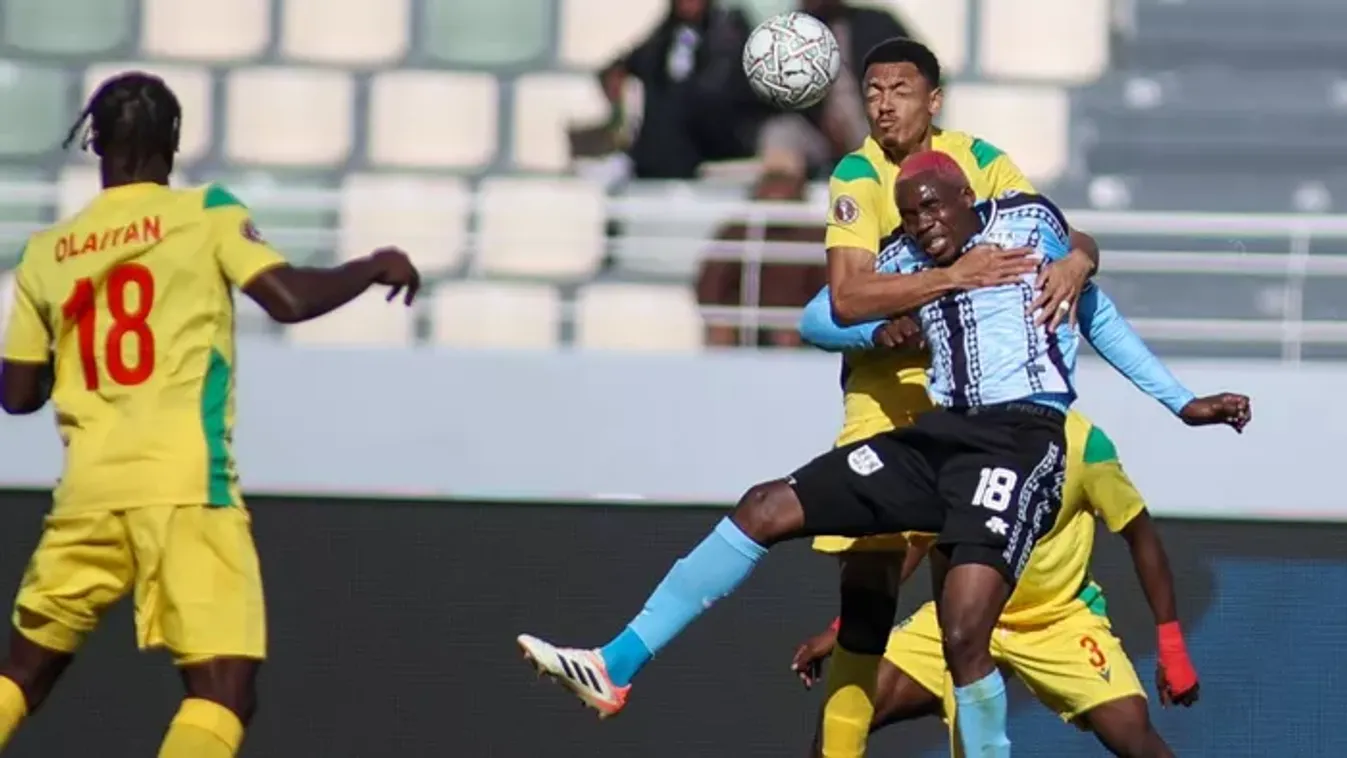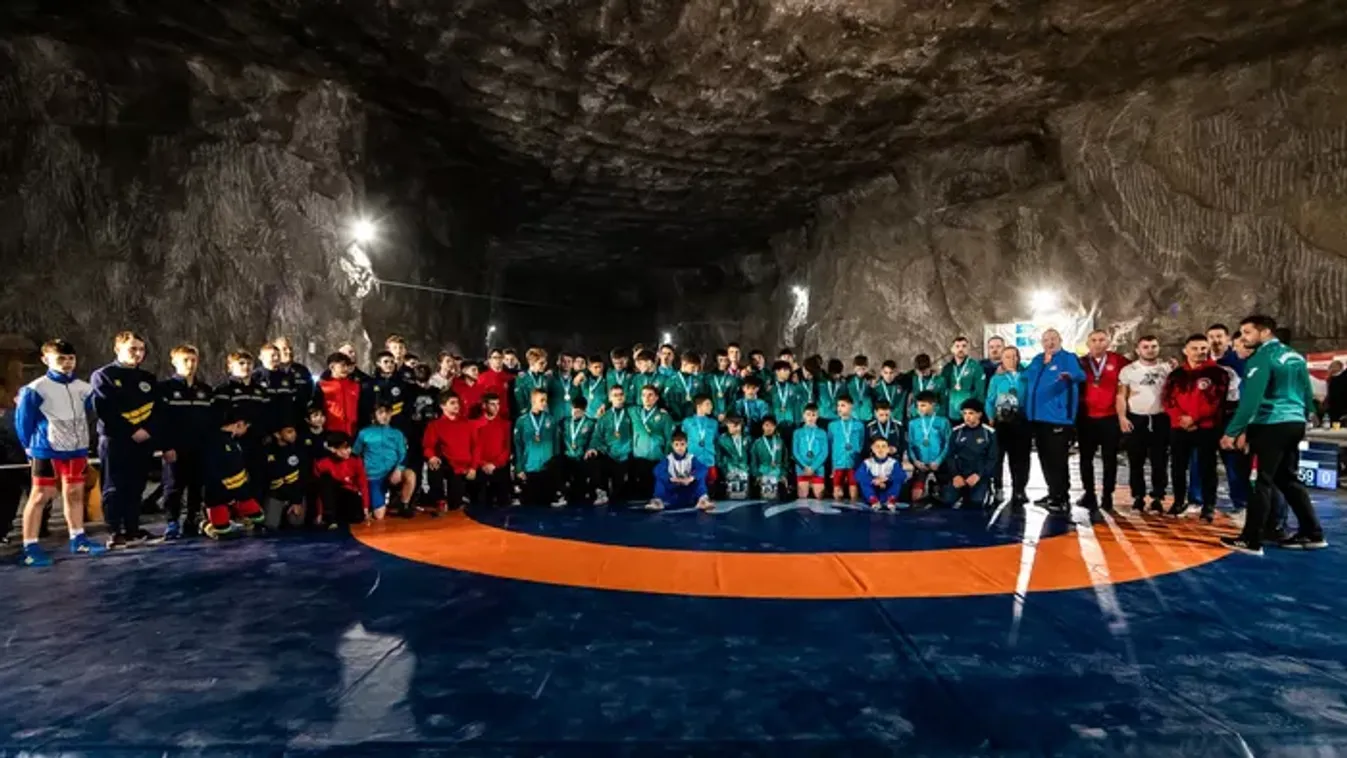Anita Görbicz: I think my career is a full circle
“I WANTED TO ENJOY EVERY MOMENT OF THE GAME" – NSO TV'S REPORT (IN HUNGARIAN)
“I WANTED TO ENJOY EVERY MOMENT OF THE GAME" – NSO TV'S REPORT (IN HUNGARIAN)
– In recent weeks, you've played the last one of almost everything: league, cup, Champions League matches. How did you prepare mentally for your farewell?
– I tried to accept that it was coming to an end, and in the post-match interviews, I really felt that I wasn't ready to say goodbye. Maybe you can't prepare for that, but I've tried to live through the last moments of my playing career. I'm not saying I was looking forward to the end, but as I sit here in front of the trophies, I feel like my career is a full circle, and I can be proud of myself.
– After winning the Hungarian Cup final four, it was Eduarda Amorim's idea, who left the club, to make your teammates toss you. Did we see right you were quite surprised by the action?
– Yes, I was. Duda was better prepared for this, and she was the one keeping track of how many days we had left in Győr's colors. I really tried not to deal with it, I was just trying to focus and prepare as best as possible for the last games. I didn't want my thoughts to just revolve around the farewell.
– By the way, have you ever been tossed?
– I don't think so. But it was Duda, for example, who also made me aware that the Champions League quarterfinals at home against Budućnost was my last game in the series I played in Győr. She was nice, she gave me a nice bouquet.
– It also seemed symbolic that all of your world-famous teammates wanted to take a photo with you.
– I'm surrounded by very good people, it's a pleasure to play with them. I'm lucky because I've always had excellent teammates in Győr who were outstanding not only as players but also because of their human qualities. It was the only way to achieve success together. Of course, my teammates know that this is the end of my career, and maybe they were happy to play with me. There are some players in the current squad who, by their confession, started playing handball because of me.
– Can you tell who?
– Let's just leave it at that... (laughs). But it's nice to be respected and looked up to while I'm one of them.
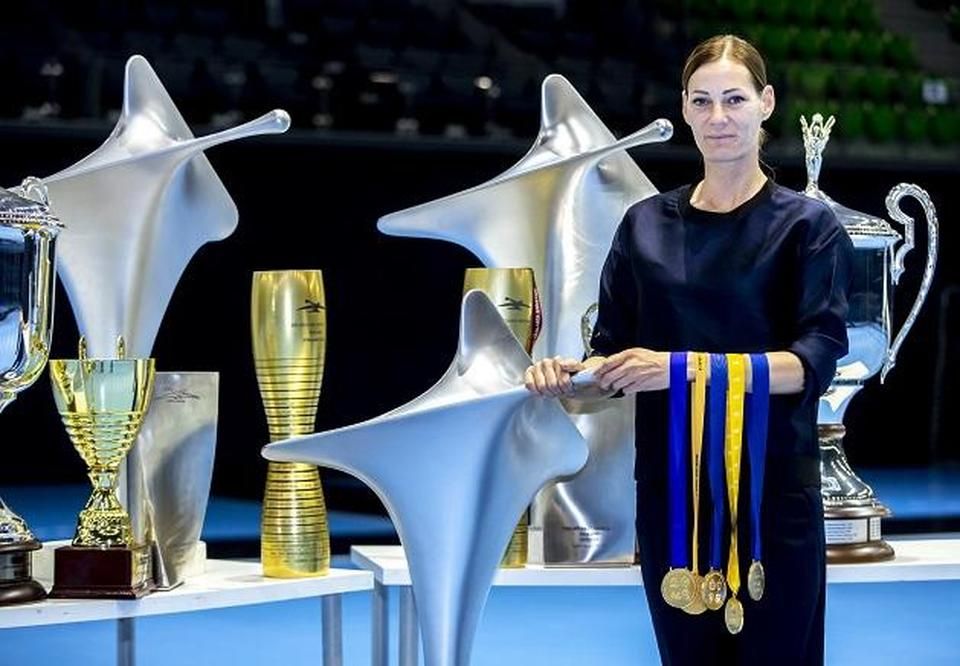
SHE ALWAYS WANTED TO WIN
– At a young age, you sometimes seemed like a self-righteous player. How do you remember yourself from back then when you burst into the top flight?
– Yes, a lot of people used that label for me, but I tried to enjoy every game when I was young, and of course, I always wanted to win. I enjoyed playing in front of spectators, showing them what I could do. I think I did that a lot. When I couldn't, it also helped me become a better player. I've learned from those mistakes. After the birth of my son Boldizsár, I became even more patient, calm, and thoughtful on the court
| Born:May 13, 1983; Veszprém |
| Height/Weight:173 cm/58 kg |
| Playing position: center back – left winger |
| Clubs: Győri Audi ETO KC (1997–2021) |
| Coach: Kálmán Róth |
| Club coaches:Zoltán Basák, Lajos Horváth, József Vura, Kálmán Róth, Csaba Konkoly, Karl Erik Bøhn, Martín Ambros, Gábor Danyi |
| First national team cap: August 23, 2002; Miskolc (–Norway, 31–29) |
| Last national cap:December 10, 2017; Leipzig (–France, World Championships eighth finals, 26-29) |
| Caps/goal:233/1111 |
| Achievements:Olympic 4th (2008), Olympic 5th (2004), World Championships runner up (2003), World Championships third place (2005), 2-time World Championships 8th place (2007, 2013), 2-time European Championships third place (2004, 2012), European Championships 5th place (2002, 2006), European Championships 8th place (2008), 5-time Champions League winner (2013, 2014, 2017, 2018, 2019), 3-time Champions League runner up (2009, 2012, 2016), 3-time EHF Cup runner up (2002, 2004, 2005), KEK runner up (2006), Junior World Championships runner up (2001), 13-time Hungarian champion (2005, 2006, 2008, 2009, 2010, 2011, 2012, 2013, 2014, 2016, 2017, 2018, 2019), 14-time Hungarian Cup winner (2005, 2006, 2007, 2008, 2009, 2010, 2011, 2012, 2013, 2014, 2016, 2018, 2019, 2021), World's best (2005), 6-time Player of Hungary (2005, 2006, 2007, 2013, 2014, 2017), Capped for Team Europe (2008), 2-time Champions League Top Scorer (2012, 2014), Hungarian National League I Top Scorer (2008) |
– The half-smile on your face, known from the beginning, remained throughout your career. Have you always wanted to entertain the audience?
– Handball today may not be so spectacular anymore. We're moving towards a game based on running and strength. I actually preferred the older days, when there were more finesse solutions, beauty and maybe even the fans enjoyed what they saw more. I've always wanted to show what I learned in training or from someone else.
– You made your debut in Győr's senior team very early on, at the age of just 17. Did you get accepted easily in the locker room and on the court?
– Before my debut, I had been training with seniors for a long time, and it wasn't easy because many of my teammates were 10-15 years older than me. But it was thanks to them that later they counted me as a starting player. I learned a lot from them and got a lot of help.
– Did anyone take you under their wing?
– Several people, actually. I could always count on Beáta Hoffmann, Mariann Bordásné Horváth or Anikó Nagy. Later, Kati Pálinger also helped a lot.
– As a center back, you had a huge burden on your shoulders from a young age. How did you deal with that?
– I didn't really feel pressure; I just wanted to do my best. If something didn't work out, I didn't deal with the "outside" opinions, all that mattered was what my coach and my teammates were saying. Later, I became more sensitive, and I was sometimes touched by the fans' critique. And success is always easier to process.
– After 1959, ETO became Hungarian champion again in 2005. Essentially, its dominance in Hungary dates from there, but the international successes came later. Did you have to go through a learning process?
– I think even after the Hungarian Cup, which we won also in 2005, we thought that something had finally taken its place, that our time had come, that we could not only win silver and bronze medals. We had to fight hard for everything, and we learned a lot from the failures, personally I and the club as well.
– How did you feel when you were so close to the final victory several times, but it didn't work out for a long time?
– It's very difficult. It's true that we didn't have a lot of free time back then, and we had to move quickly through the setbacks because the next season and preparation came in at lightning speed, so all we could do was say we'd do it this time. We kept saying ‘next time' for a long time, and we realized it wasn't enough to say it – we had to do something about it. Even if we felt we had done everything we could, we were looking for ways to get closer to ultimate success. And that was the key, we always wanted to improve.
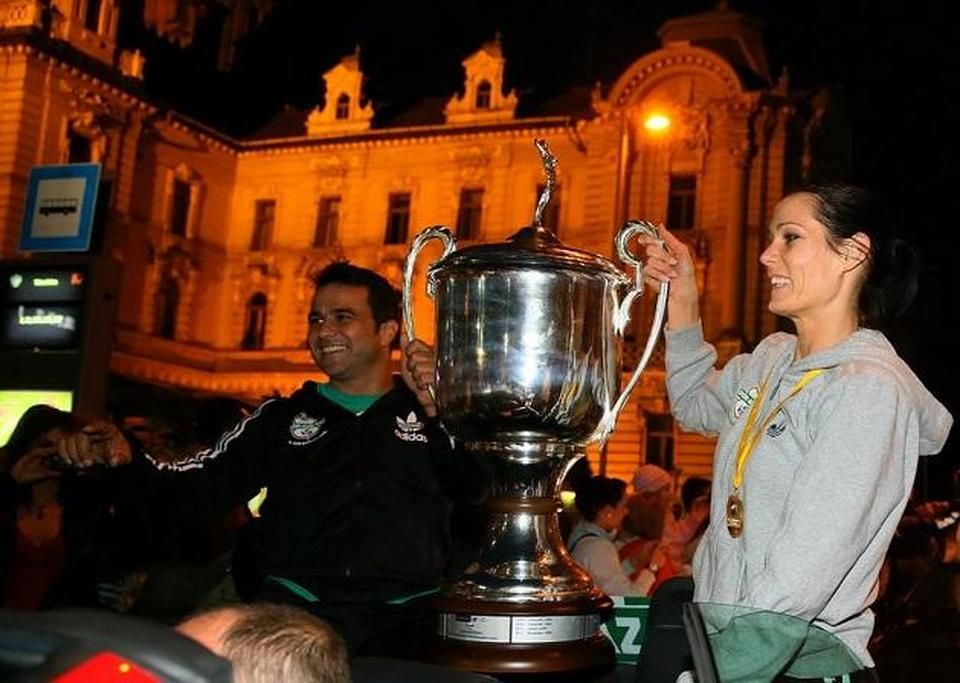
SHE WOULD'VE PREDICTED ONE
| Kálmán RÓTH, former ETO coach: "From the very first moment, you could see that she was a great talent and had a serious future ahead of her. She was the leader in every game, and always found a solution to everything. She knew a lot of movements that couldn't be taught. A typical story of her attitude is when, in the fourth grade, we played a national student Olympiad final against a team of stronger girls from Budapest. She fell in the heat of the match. One of the opposing players ran over her, and even her footprint showed well on the jersey. Görbe wasn't bothered; she was on the court the next minute. She made handball attractive, a lot of young people started playing because of her, she was their role model, and she didn't just get letters from home but abroad as well. It's a great deed that a girl from Győr has reached such heights." |
– Did the first Champions League success in 2013 take the burden off the team?
– Yes, it was an incredibly uplifting feeling to finally win, and it put my heart at ease. We felt that the great success had finally arrived, that the tremendous amount of work had paid off. Now, I'm looking at the trophies again – I wouldn't have told you 10 years ago that I would be a five-time Champions League winner. Okay, I would've predicted one...
– Have you improved and achieved great victories with the club?
– That's right. After one of the Champions League finals we lost, an outsider said we had a good team, but something was missing. At the time, I thought, how would he know when he doesn't see what we do, train every day to succeed. The criticism was good, so I could think more about what it would take to win, and then maybe I could figure out something that I could pass on to the team later.
– What was the secret?
– The players had to open up and trust each other even more. We've had a lot of meetings before big games, and I've been trying to make the girls aware that if someone makes a mistake, someone will be there to help. A lot of the teams that had world stars didn't win anything. I think we were always successful as a team.
– There has to be a hierarchy in every locker room, and it's clear that Anita Görbicz was at the top in ETO's. Was there anyone who couldn't or didn't want to be in this hierarchy?
– Don't ask who, but yes, and she didn't play in Győr for a long time.
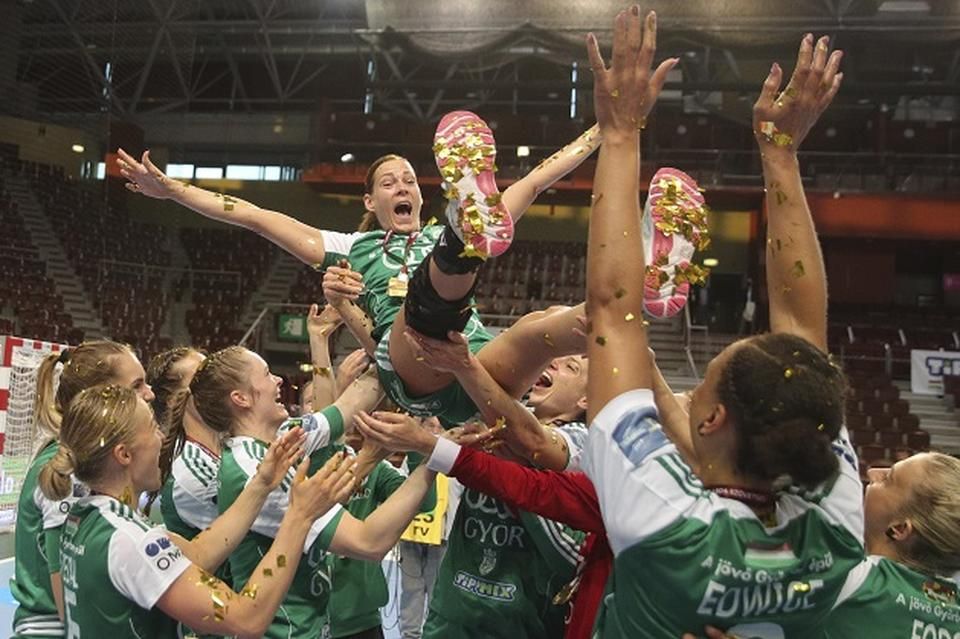
STILL REMAINS A PLAYER
– What did you feel then you went from a center back to a winger?
– At first, I didn't think much about it. The main thing was to play and be a part of the success. I'd be lying if I said after a while it didn't hurt, but then I realized that I had to look for new challenges in this position, and I just focused on being the best there and doing my best to succeed.
– You've also proved that you can lead even from the side.
– When I was put in the left wing, my teammates knew that it wasn't my primary position and that I was thinking like a center back. That's why there have been many times when players from inside posts have asked me for help.
– In recent months, your playing career has been running parallel to your new life, as you also work on the national team's professional staff and have been able to try yourself on ETO's bench as a substitute coach. Has that changed your relationship with your teammates?
– I don't think so. Everyone knows I'm going to stay at the club as sporting director and maybe they're happy about that. I don't think they expect me to be in the office all the time, they want me to go into the locker room and help if I have to. I think I'm going to remain a player for another year or two, but I'll just have other responsibilities.
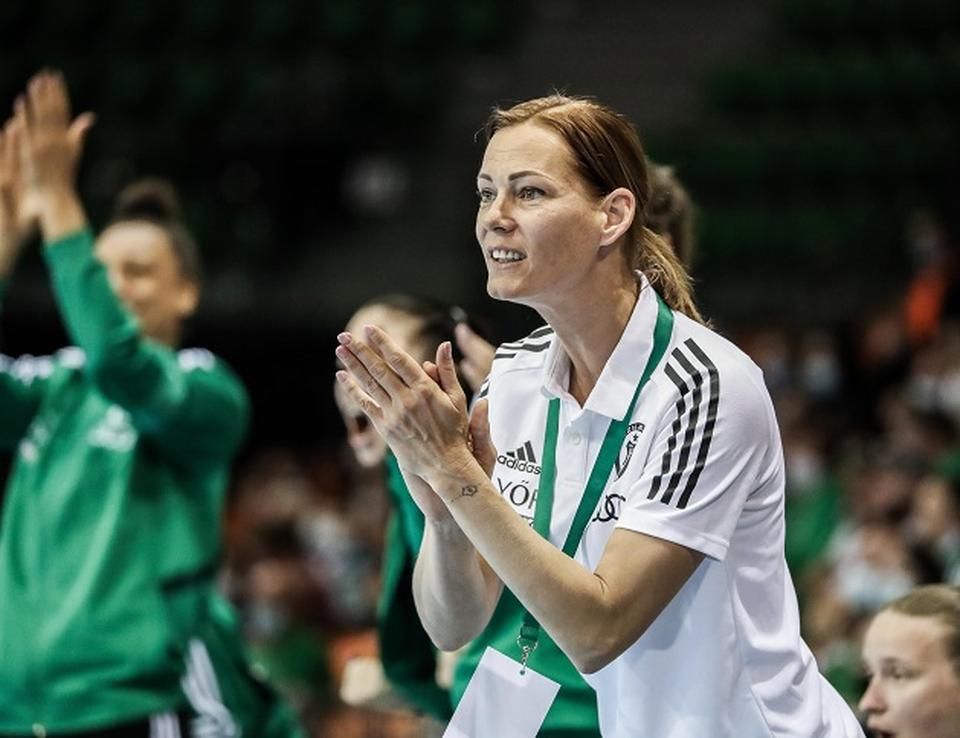
– Which was the best team you played for in Győr?
– This is a very difficult question, and I can only say what I've said before. They were all great for something, even the ones that we didn't win anything with. I loved the familiar atmosphere of the Magvassy Sports Hall where the fans came to two hours prior to the games to have seats. The facility was already full when we arrived for the match.
– Was there any player you regret not having played with?
– Yes, Bojana Popovic would've been nice to play with. I would've loved to have served her as a center back.
| Eduarda AMORIM,ETO's left back: "When I hear Anita Görbicz, I think of a queen... It was a huge honor to play with her. I learned a lot from her. Anita is a true leader, and we have great memories together." |
| Estelle NZE MINKO,ETO's center back: “I lot of things come to mind about Görbe. I watched her play as a kid, and I learned from her. I never thought I'd be able to play with her later, which I'm living as a huge opportunity. She's a true legend. There aren't many like personalities in women's handball, maybe none. It's important to point out that she's not only a great player but also a great person.” |
– Was there a moment when you thought about transferring? Once, for example, you had a blank contract in front of you.
– I had two options that seemed promising. One of them is really the blank contract story, but I was very early in my career at that time. I was invited to Denmark where one workout a day was the norm, but I got used to the two or three a day. I don't think it would've been a good idea to go there. Maybe for a year or two, I could've done my best that they're used to, but my performance would've dropped afterward.
– And the other offer?
– Valencia contacted me, and I went to Spain for two days. I was a football maniac, and all I asked for was a season ticket to the Mestalla Stadium, but they just went bankrupt, so I didn't transfer there either. Anyway, I didn't think about switching, as this is the team I wanted to succeed with.
– What does it mean to you to become a club legend of ETO?
– It's a great honor, although I don't want to put that label on myself. ETO is my second family, I'm happy that I've had success here and I've come out of difficult situations. When I came to a game as a kid and I saw the fans, I wanted them to later clap for me, encourage me. I wanted to ingest this wonderful feeling. I've had a great career, but there was a lot of work done behind the scenes.
– In what proportion did talent and work result you reaching such a high level?
– It's pretty much equal. I'm not saying I wasn't talented because as a kid I saw that I had abilities that my peers didn't have. But without humility and wanting to win, it would've been worthless.
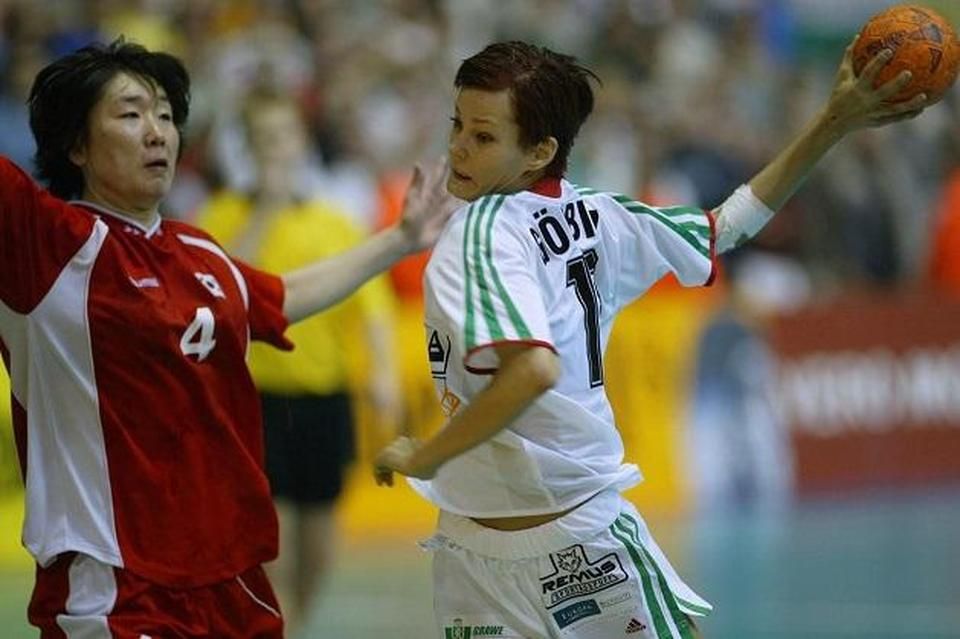
YOU CAN'T HAVE EVERYTHING
– Your first major tournament with the national team was the 2003 World Championships, in which the Hungarian team won the silver medal. Do you still think of this as your favorite tournament in the national team jersey?
– Yes, it was a great experience. We played our group games in Croatia in front of a full house, it was like being on home grounds. Obviously, it would've been better to come home with a gold medal, but these days we'd love a World Championship silver as well... Of course, it felt like a big failure at that time that we lost the final against France.
– It's an iconic image when Karl Erik Bøhn put you on his shoulders after winning the bronze medal at the 2012 European Championships.
– I don't remember anyone else doing this to me. I was also surprised, but I enjoyed every moment of the European Championships. We had a good team and I felt getting third place was a great success.
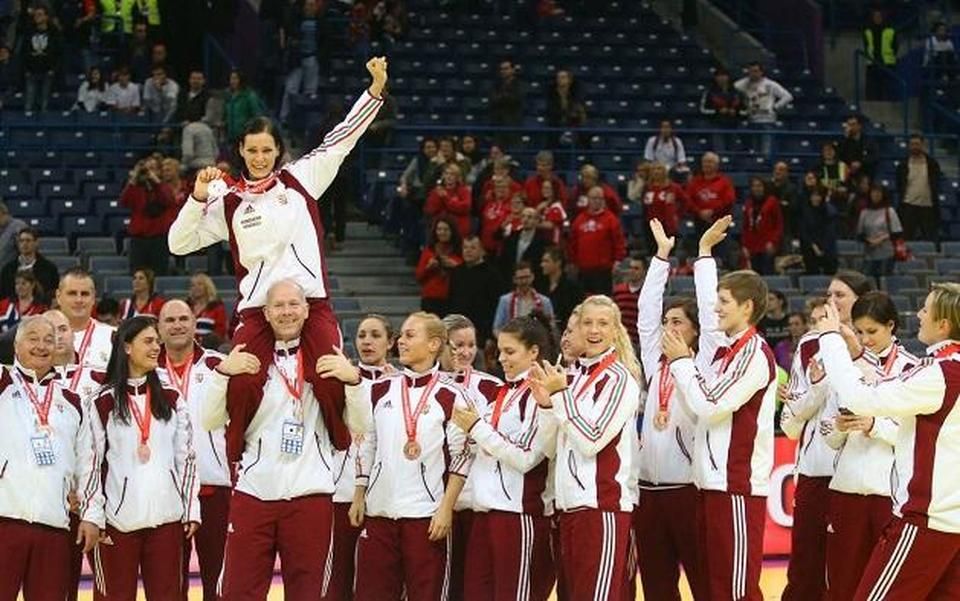
– You abruptly announced your retirement from the national team after the eighth final relegation at the World Championships four years ago. Don't you feel your history with the national team is incomplete?
– I discussed with my family, the head coach before the World Championships that this would be my last world competition with the national team. After the defeat by France, I was taken for a long doping test. Then on the way from there, I wasn't in a good mood when a reporter caught me, and I answered the question stupidly. That taught me when to keep my mouth shut. I didn't want to announce my retirement from the national team that way, but the media kind of twisted my words.
– Is an Olympic medal missing from your collection?
– I could feel bad about this, but it's not worth it. I'm proud to think back on all my successes with the national team. In 2008 in Beijing, we were close to the medal, but we couldn't get it. It might hurt a little, but you can't have everything.
– You travel to Tokyo as a member of the professional staff. Can you give young people the experience they need to manage the Olympic maelstrom?
– During times of cohesion, I talk to everyone. I help them where I can whether it's tactical or mental advice. Sometimes I knock their heads or try to use nice words to make them perform the best they can.
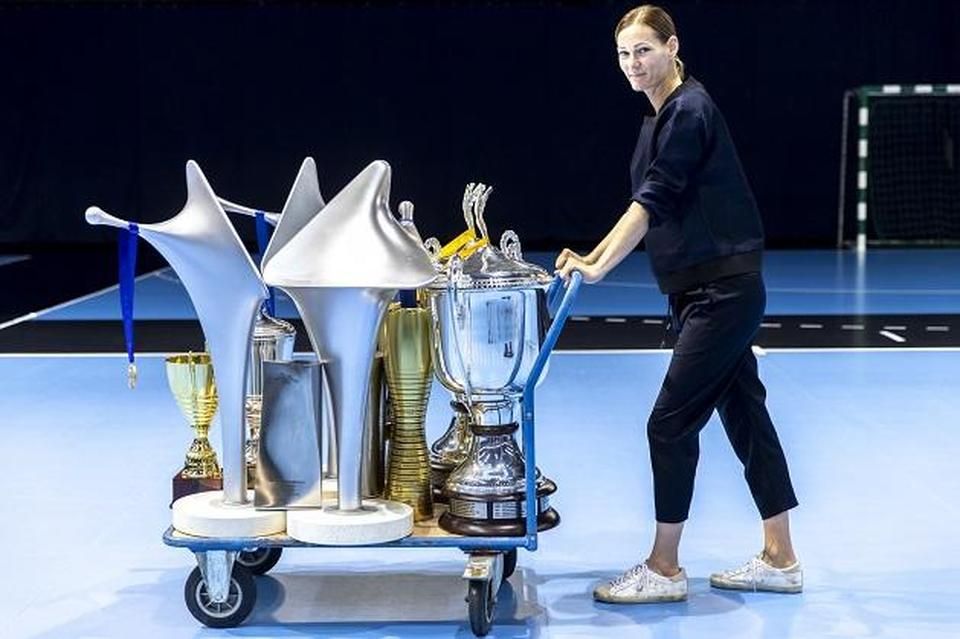
SHE LOVES GYŐR AND LIKES TO LIVE HERE
– László Nagy and your career have some parallels in terms of the fact that when you were at the national team's disposal, the opponents also had a different attitude towards the team. At the same time, the responsibility was much greater.
– You don't feel that way during the matches. When I was in a tough situation, like in the endgame, I never thought I had to pass the ball. It wasn't a burden; I loved the challenges. The other day, I gave Laura Glauser seven-meter throws during training, and we were encouraging each other by imagining five million people watching the shots. I get excited by tense situations; I like to live those moments. Of course, there's a possibility of error as well.
– Do you like Győr? Do you enjoy a coffee on Széchenyi Square or walking with your family in Püspökerdő?
– I love Győr, and if we have the opportunity, we go hiking or visit our favorite restaurants. We haven't had much time so far, so I'm hoping that at the end of my career we'll have a lot more chance for moments like these as well.
| Katalin PÁLINGER, Vice President of the Hungarian Handball Federation (MKSZ): "From a very young age, she had solutions that no one else knew, and I don't think anyone knows now either. Humility for the sport has followed her career. We've been through a lot of serious battles together, and we've always been able to count on each other. We've looked at each other countless times and said, 'Relax, I'll take care of it.' Without her, handball will be much poorer not only for Hungary but also for the world. Her abilities were also able to prevail in the new, accelerated game. Sometimes I see moves from Vjahireva that remind me of Görbe. There's no one else in current women's handball who would be similarly special. That's why we insist her stay in the sport. She has already added a lot to the successful Olympic qualification from the sidelines. Her authority and knowledge matter a lot, the girls look up to her. I'm happy that we'll work together again in the future, even if it's a different role now.” |
– Was it hard for you to get used to the love of the fans? Can you always be nice when, for example, someone comes up to you in a restaurant to get a photo with you?
– When the World Junior Championships was held in Győr in 2001, they stopped me in the street. At the time, it felt awfully good that a stranger knew who I was. I'm thankful for the kind words now too. Of course, there are worse moments that I don't like, but you also have to be able to handle them. I don't like it when someone almost yells into my ear a meter away from me that "Anita Görbicz is here." By the way, I like to talk to people when they approach me in a store or on the street. I think it's going to be weird when they don't recognize me anymore...
– How much did it help your career that your husband, Ottó Vincze was also an elite athlete?
– It meant a lot. Especially after Boldizsár was born, the situation became more difficult, the comeback wasn't easy, I was constantly in a hurry after training, and spent less time with my teammates. That's when you know how hard it is to continue to be an elite sport after childbirth. Ottó and our parents helped a lot. Regarding my career, he's a perfectionist, and he was able to show the way of progress after a game even when I thought I played well.
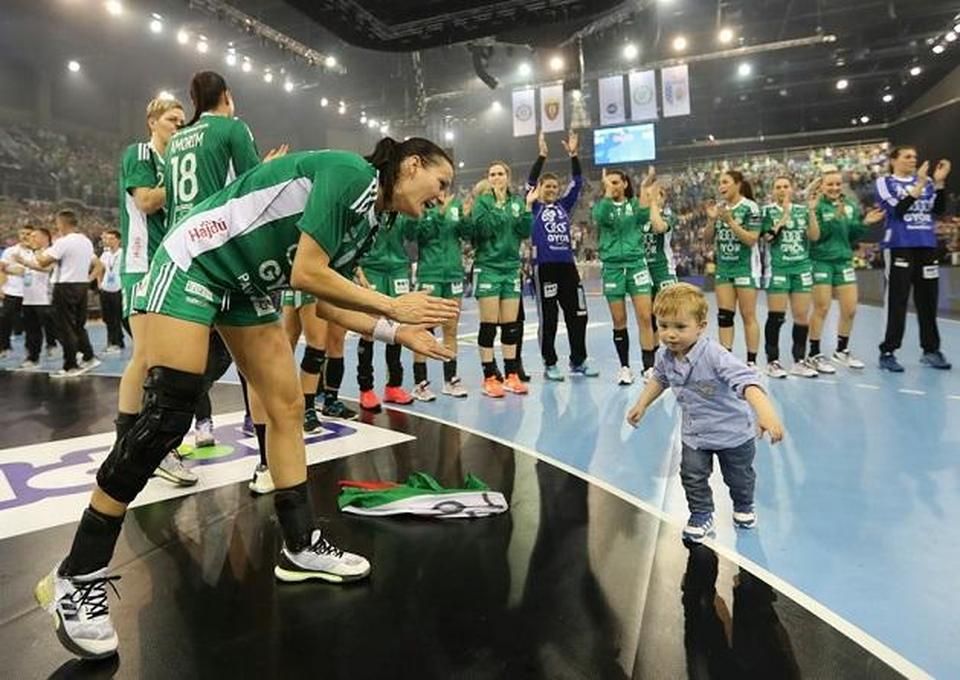
| CHAMPIONS LEAGUE |
| 13 goals in three games each |
| 04.15.2007:–Slagelse (Denmark) |
| 11.10.2007: –Koprivnica (Croatia) |
| 04.18.2009: –Hypo NÖ (Austria) |
| NB I |
| 18 goals:11.14.2007, –Debrecen |
| 17 goals:09.23.2007, –FTC |
| NATIONAL TEAM |
| 16 goals:08.19.2006, –Russia |
| 13 goals: 12.15.2007, –Algeria and 03.29.2014, –Croatia |
– How much has Boldizsár's birth changed your view on life or sports?
– A lot. Before, there was recovery time between trainings, but now when I go home, there's no rest. Nevertheless, I've changed. I positively see a lot more things, and if I make a mistake, I look for a way to correct it. I'm also more patient with my teammates, and perhaps I've become more helpful. Sometimes, I take care of others a lot more than I take care of myself.
– Can you imagine that one day you'll move out of Győr, or will you remain loyal to the city just like to the club?
– I never thought about that. Now I'm saying no, but who knows what the future holds. Boldizsár's going to start school in the fall, and I'm sure it's not going to be a topic for a while, and I don't think it ever will be. I like living here.
– You'll be a sporting director and will be working upstairs soon. Have you taken lessons away from the management during your career?
– I didn't care about what kind of a sporting director someone was before. I was a player, and I was interested in handball. For the past six months, however, I have started to map the structure and functioning of the club, and I was watching the process.
– Do you have dreams for the next phase of your life?
– Regarding work or personal life?
– Both.
– Yes, but let me keep that my secret for now.
Translated by Vanda Orosz
